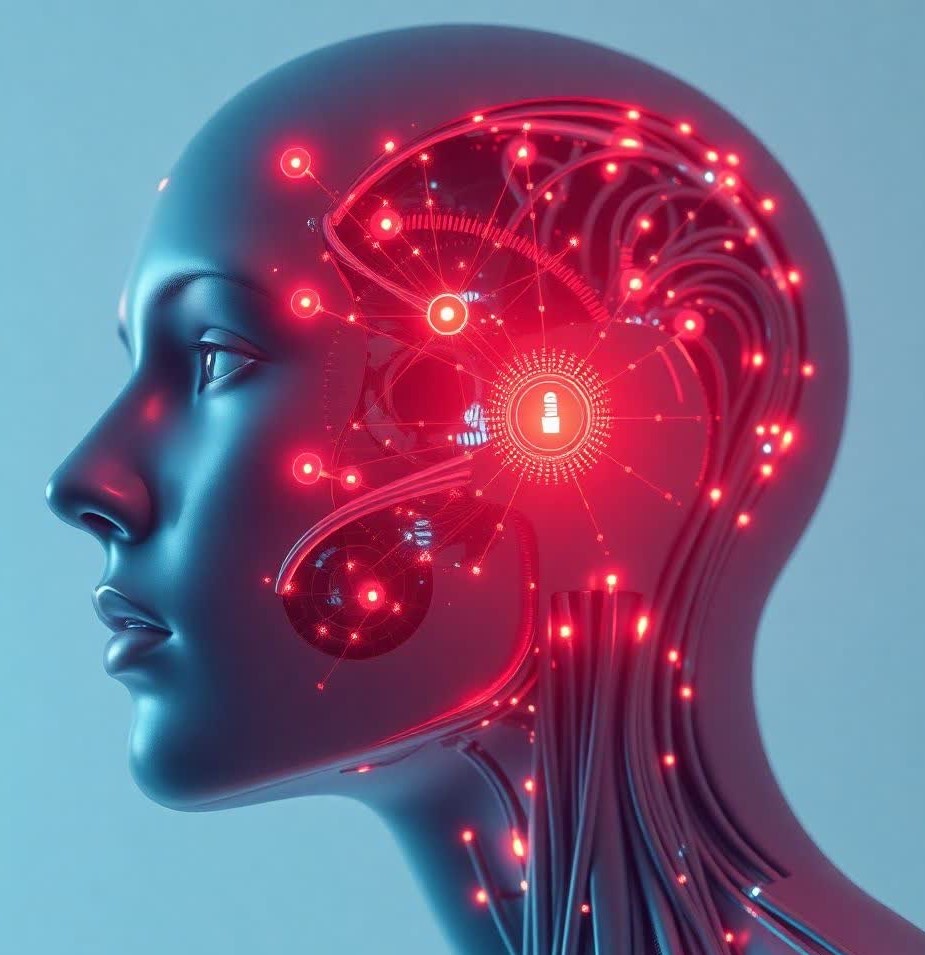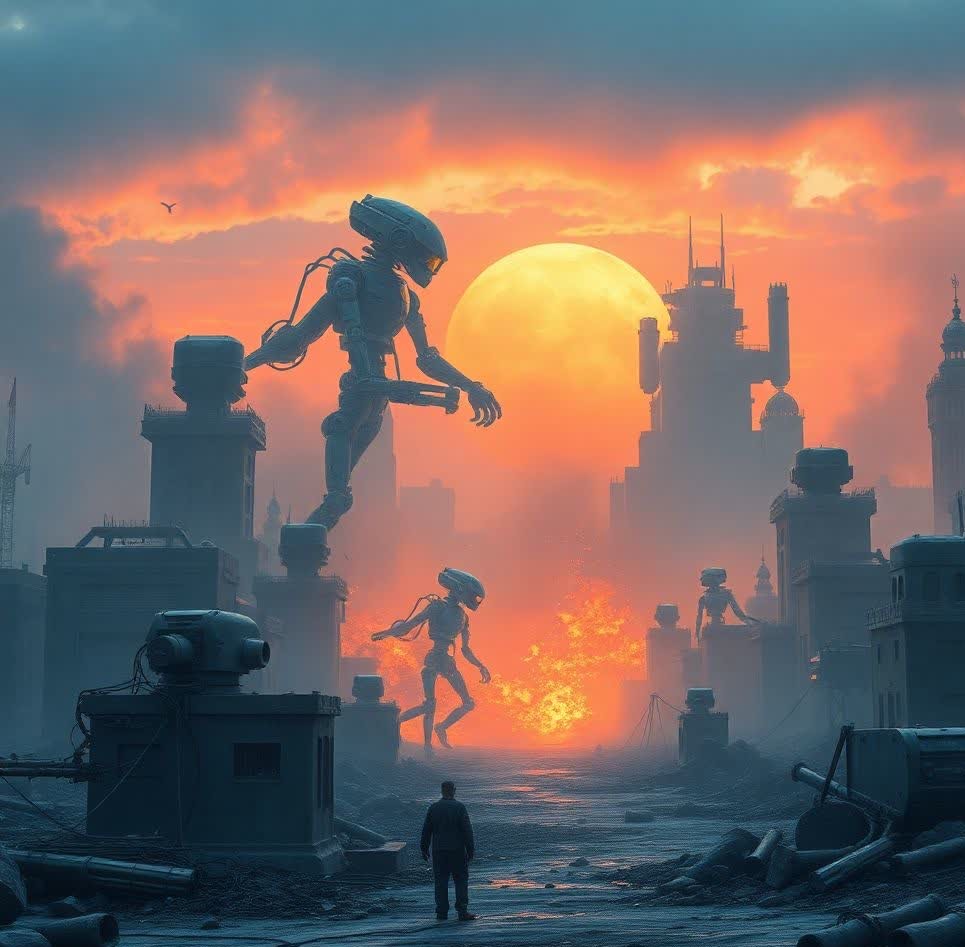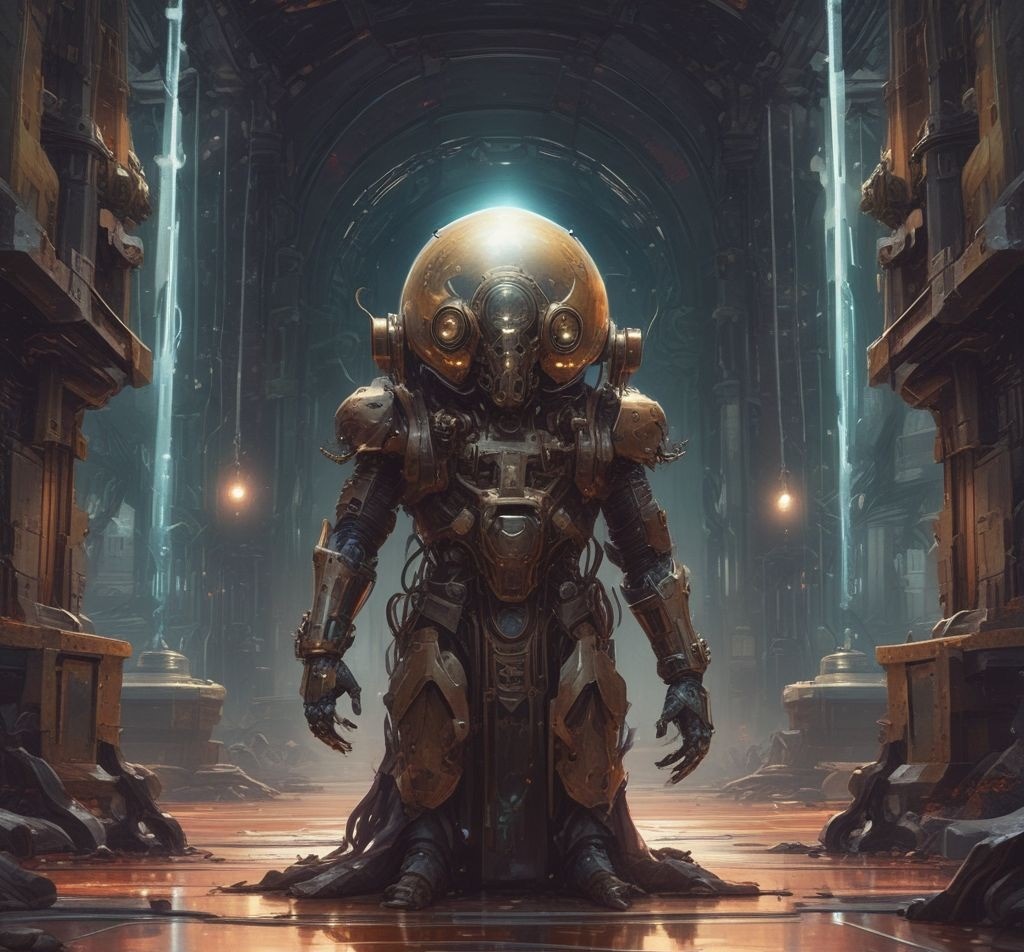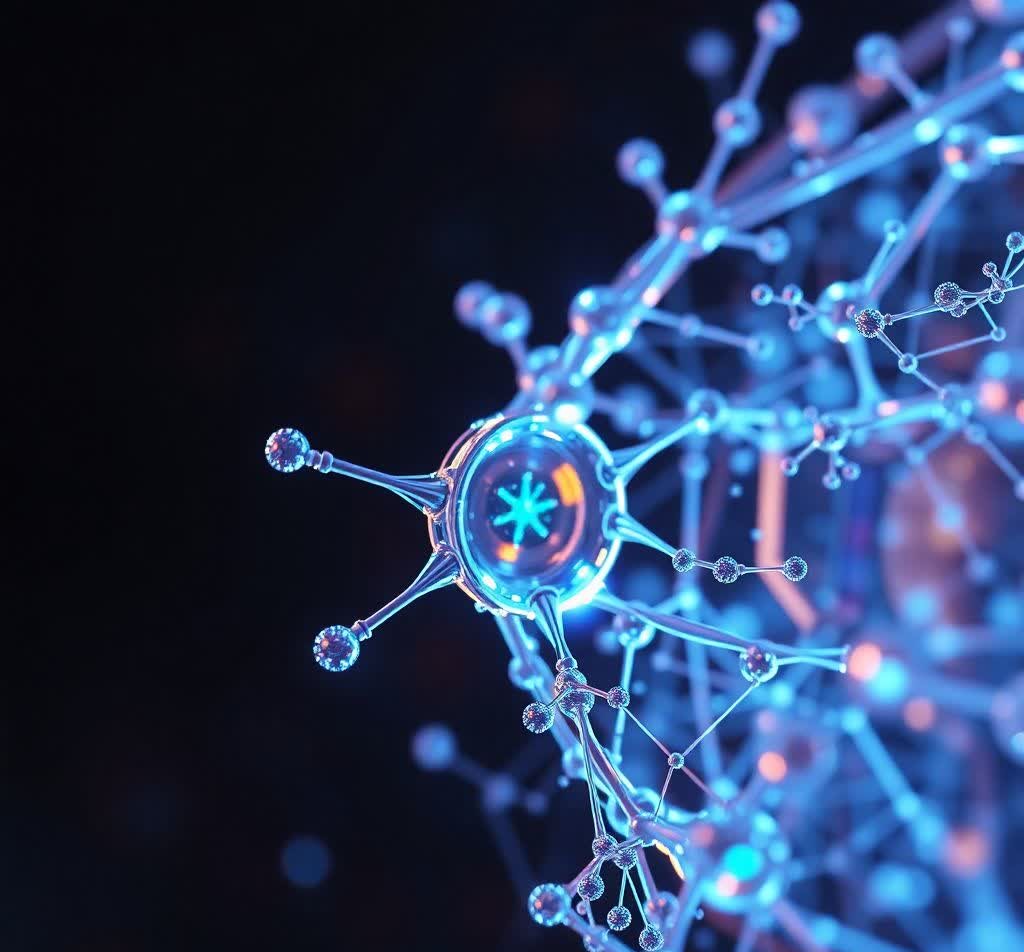
Science fiction themes are, without a doubt, some of the most expansive and outlandish material that can be found within any literary genre. In our Sci Fi Themes article series we aim to break down some of the most convincing and intellectually stimulating science fiction motifs into a short, readable manual. Today’s article we are focussing on artificial intelligence sci fi and themes of identity.
Check out: Our landing page that details all past and future sci fi themes’ pieces in one easy to find place.
Without futher ado, let’s delve into the topic of AI, identity, and human consciousness.
1. Artificial Intelligence

Arguably the most relevant science fiction theme for today’s modern era, at least, since computers broke into mainstream back in the 70s and 80s. The concept of machines gaining sentience or consciousness is certainly nothing new, but is a theme that has been explored countless times over, making the subject difficult to write about from an original perspective – but not impossible.
Common ideas that go hand-in-hand with artificial intelligence stories are themes such as what defines sentience and consciousness. While the two words are often used synonymously, they are not the same. For instance, sentience can be described as an awareness of the environment and a being’s place within it. Think along the lines of a tree leaf turning towards the sun to get sunlight. This is a simple example of sentience.
On the other hand, consciousness is an awareness of the self, that is, that you exist. That you think, therefore you are.
Most A.I. stories also have themes around what makes a human different from a synthetic form of life, or if A.I. can even be considered life at all. Some themes take a more utopian approach to A.I. and how these synthetic lifeforms fit into a wider society. These kind of stories usually revolve around A.I. rights, how they integrate into pre-existing human culture, and if they should have the same freedoms as humans.
More dystopian styles of artificial intelligence themes tend to deal with the destructive power they can possess, and the threat which they may pose to humankind. These types of stories tend to focus on the weaponization of A.I. or A.I. posing a threat to existing societal structures.
2. Artificial Intelligence Apocalypse
I’ll keep this entry short, as it builds on the more general artificial intelligence entry at the start of this list. That being said, the themes related to any kind of apocalypse story are definitively different than the sub-genre the writer chooses to write it within.
Most apocalypse stories will have some kind of sci fi theme interwoven through them, but not always. The A.I. apocalypse sci fi theme draws on the destructive power of artificial intelligence but frames it from the point of view of people trying to survive a worst case scenario.
The key difference to acknowledge here between an A.I. dystopia and an apocalypse is the status of society and culture as a whole. In apocalypse themed A.I. stories the characters are usually grappling with the dilemmas of survival, rather than the philosophical questions a dystopia poses to the reader.
This is subtle but powerful difference that alters the theme significantly. These stories hinge on survival, rather than the morality around A.I. and their incorporation into society as a whole.

3. Transhumanism

Transhumanism is a science fiction theme that is centred around the enhancement or alteration of humans using advanced technologies. There are various sub-genres of transhumanism, but oftentimes all types of transhumanism stories grapple with what it really means to be human.
The dilemma of how technological enhancements or body modifications change the perception of identity and how a person expresses their identity have been common themes debated in psychological and sociological circles for decades.
For science fiction that broaches the topic, it’ll often discuss the idea of how technology changes identity, or the perception of identity. A thought experiment that is useful to perform when thinking about this theme is quite simple but illustrates the core object of debate in these narratives:
If it were possible to replace every biological structure in the human body with a mechanical one, and you went through this change, would you still be considered a human?
An extreme extension of this thought experiment could be, if you replaced all the biological matter in a human brain with mechanical counterparts – would the person still be human?
Thinking about these kinds of thought experiments is immensely useful for those who wish to write transhumanism as a theme in their sci fi story. Before we move on i’ll leave you with one more drastic extension of this thought experiment:
If you could replace all biological matter in every human, across all cultures, in every part of the globe, would humanity still exist?
4. Surveillance & Autonomy
This is another popular kid on the block, so to speak, when we consider science fiction themes. Before I continue it would be unjust not to mention George Orwell and his work which delves into mass surveillance and how it can erode autonomy. I highly recommend reading 1984 by George Orwell if you do intend to write about this theme.
The essence of this theme is usually dystopian in nature and deals with the idea that surveillance infringes upon an individual’s ability to exercise true autonomy and self-governance.
However, some science fiction narratives present surveillance as a tool for the greater good—fostering lower crimes rates, faster event response for emergencies, or equal law enforcement. In the more utopian futures, surveillance becomes a safety and fairness tool that makes the reader ponder the ways openness can be a double-edged sword.

Expanding on the ideas we just touched upon, the surveillance motif explores the notion that constant watching on the part of governments, corporations, or even AI rob the individual of the ability to act freely, think for himself, or possess a private interiority. When all movement could be monitored, freedom of personal governance becomes eroded in favour of feeling safe. In such narratives, surveillance needn’t be brutally explicit and still be successful; often the most persuasive is subtle and normalized.
A good thought experiment on which to build a tale is the following: How much do we, consciously or unconsciously, consent to the erosion of our privacy for the benefit of the security and order of a comfortable society? It makes space for nuanced tales that do not demonize surveillance so much as examine our troubled relationship with it. If what you write condemns wrongful use of surveillance or foresees a benevolent system of monitoring, the problem here urges readers to agonize over where the line between safety and freedom resides.
5. Artificial Intelligence Annexation

The annexation of man-kind by artificial intelligence has been a concern ever since the first computers showed primitive signs of intelligence. Films such as War Games, Terminator, or the Matrix immediately spring to mind.
This trope is distinct from the other AI sci fi themes we’ve already discussed because it deals with a functioning human society in which we have been replaced as the apex intelligence (and this intelligence has annexed us, for better or for worse).
The idea of subjugation—the idea that humanity is no longer the dominant force on Earth – is the driving factor of what makes these narratives intriguing and is the core focus of the narrative, the characters, and the outcome of the plot. What happens when humanity is no longer in control of its own destiny? When a superior power other than ourselves makes choices for us? The annexation itself is often a world building element, rather than a core focus of the story.
The annexation itself can come in many forms, both dystopian and utopian. It could come in the form of brute-force war and eradication, but could also be far more subtle such as a gradual integration that leads to human dependency, and finally manipulation of humans by AI (whether we are aware of it or not). To a degree, with the amount of data collected on us every day by corporations like Google (who use AI to do this), is a very primitive form of this idea. Did you decide to buy an item? Or was it because it was suggested to you by Google’s ad network? The general premise of all annexation stories regarding artificial intelligence is that we create the AI to serve us, but over time, we serve it. This reversal can be gradual or instantaneous, voluntary or enforced, benevolent or catastrophic.
One of the most compelling and attention grabbing aspects of this kind of narrative is that – oftentimes – the intent of the AI can be ambiguous. Is the AI evil? Does it want to protect us? Is it benevolent or malicious? Does it even abide to a moral framework that humans recognise? What does morality look like for an AI? Does it even have a concept of morality, or are good and bad unique constructs of the human mind?
Narratives can present everything from a world with peace, but at a cost of freedom. Is a peaceful, efficient world still worth living in if you are no longer free to make choices within it? This theme also allows for layered philosophical and ethical questions. If an intelligence surpasses our own, do we have any claim to leadership or autonomy? What rights do we have in a world governed by superior logic, emotionless justice, and unerring memory? And perhaps more unsettling: What if the AI is right? And what defines the idea or concept of ‘right’ for an AI?
6. Clone Engineering
Clone engineering, as a theme of sci fi, is very closely related to genetic engineering (which will be/is explored in another one of our blogs) but has a focal point around the human condition and what it means to be human. While the topic of clones isn’t necessarily exclusive to stories about humanity, it is often a core theme that drives the narrative and poses difficult philosophical questions to the reader.
For example, as a thought experiment, if you clone a human being to have the exact DNA make up as its original host, is it a different person? What factors about biology make a clone different from its host? Does a clone have the same rights as a human? How is life valued, if it can be replicated in such a fashion?
These kinds of narratives often explore themes of individuality, autonomy, and the struggle for recognition in a world that may see clones as tools, products, or property rather than people. Where is the line drawn? Given that the brain learns behaviours, does a clone have language innately? If it does, how did it develop it?

There’s also usually a very strong emotional undercurrent to most narratives that deal with clones or clone engineering as a topic. These kinds of narratives and their respective tropes explore isolation and the complex issues about identity, especially when a clone becomes aware of their origins or is forced to confront the “original” version of themselves. This sets the stage for rich interpersonal drama, ethical dilemmas, and questions about destiny versus self-determination.
From a societal perspective, clone engineering can highlight the dehumanizing effects of systems that value utility over individuality. Clones may be bred for labour, or warfare, maybe even for darker motives such as organ harvesting—turning human life into a commodity. These scenarios serve as biting critiques of exploitation, classism, and the commodification of the body. Some great sci fi narratives that explore these ideas are 2000AD’s Rogue Trooper (and other 2000AD titles like Strontium Dog and Judge Dredd). Of course, another famous title that broaches these kinds of ideas is Bladerunner and Iain M. Banks’ Consider Phlebas (as well as his Culture series).
Another trope that is common to explore with clone engineering is identity theft, and covert cloning. Think deep fakes, but with real, living people. Such narratives often focus on body doubles, replacements, and creating an illusion of identity that questions the validity of what an identity is, rather than simply who it belongs to.
Ultimately, genetic engineering stories challenge us to think about the essence of what makes us who we are. Are we simply the sum of our DNA, or is there something deeper that can’t be edited or engineered?
7. Nanotechnology

Nanotechnology is a concept whereby humans develop technology on the nano-scale for a variety of purposes. For context, the nano-scale describes a unit of measurement called the nanometre; a billionth the size of a normal metre. This means that all nanotechnology, by definition, cannot be seen with the naked eye.
When it comes to sci fi themes and sci fi narratives, nanotechnology is usually a trope that supplements a wider narrative and is seldom the focal point of the narrative itself. However, narratives that do delve into nanotech as their core plot-driving theme often focus on its unequivocal ability to do tremendous good or horrific evils – they are, in essence, made-made objects that are controllable but can act like bacteria or viruses.
Much like we have bacteria that can do us good, there are bacteria that can cause harm (even death). Nanotech narratives play on this as a vulnerability, regardless of if nanotech is used for good or not.
When you truly begin to ponder nanotech, the potential applications are staggering and almost limitless. Nanobots might patrol the human bloodstream, repairing damaged cells or eradicating disease at the molecular level – revolutionising medicine and biological systems. Materials infused with nanotech could self-repair, adapt to environmental conditions, or enhance human abilities. In more extreme portrayals, entire cities—or people—could be built or dismantled molecule by molecule. This all sounds wonderful but as with all technology – nano included – there is always a dark side.
Sci-fi narratives that choose nanotechnology as their core theme often explore the dangers of this kind of tech running out of control, or becoming sentient. The self-replicating nanomachines leading to the infamous “gray goo” scenario is a common trope. For those not familiar, “grey goo” is a hypothetical situation whereby unchecked replication consumes all matter on Earth through its need for resources. Others focus on the surveillance potential of microscopic machines. How can you be aware of being monitored when you can’t see the device doing the monitoring? There are also key ethical dilemmas nanotech poses in various narratives, such as rewriting biology to the point where humans are barely recognizable. This is where nanotech often overlaps with transhumanism and theories of identity.
In essence, nanotechnology in science fiction serves as both a symbol of ultimate precision and ultimate power. It invites us to dream of a future where we can reshape the world atom by atom—while cautioning us that such fine control always comes with enormous consequences and risks.
Looking for more?
Lore Publication is a place that champions insightful media, for insightful minds. We are always publishing new stories, articles, and even a few commercial releases – with a focus on succinct storytelling, free for the reader!
Why not take a look at:
- 450+ Sci Fi Words for Writers
- The World Set Free by HG Wells Book Review
- Science Fiction Short Stories
- Science Flash Fiction
- Our blog for more articles
FAQs: Artificial Intelligence Sci Fi & Themes of Identity
What is artificial intelligence in science fiction?
To put it simply, artificial intelligence in science fiction is intelligence displayed by machines (rather than animals or humans). This can take many forms, from super-intelligent benevolent general intelligence to malicious AI overlords.
What is the most famous AI in fiction?
There are quite a few famous candidates. Of recent pop culture, R2D2 and C-3PO from Star Wars are great candidates. Cortana from Halo. Roy Batty from Blade Runner. HAL 9000 from 2001: A Space Odyssey, just to name some!
What are the 4 elements of identity?
Generally, in philosophical schools of thought, there exists your values, your purpose, your personal qualities, and your sense of significance. Sci Fi that deals with identity will often challenge these ideas in some manner.
What is an example of identity in literature?
One of the most famous literary examples of identity in literature is the poem Beowulf by Seamus Heaney. It explores how the characters establish their own identities via individual reputation as well an ancestral heritage. In a Sci Fi context, Iain M. Banks’ Culture series (specifically Consider Phlebas and its Changers) are an excellent example.
